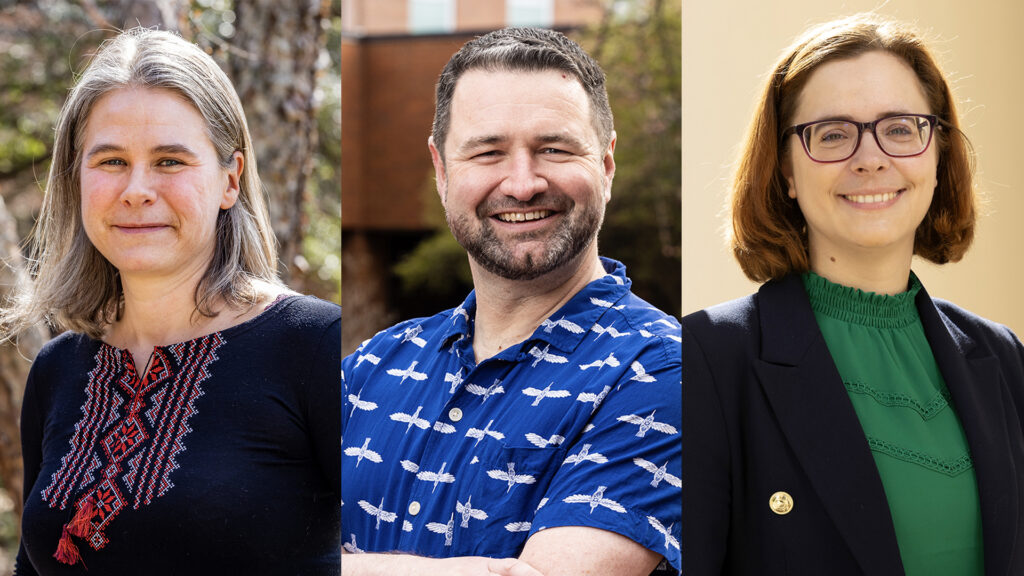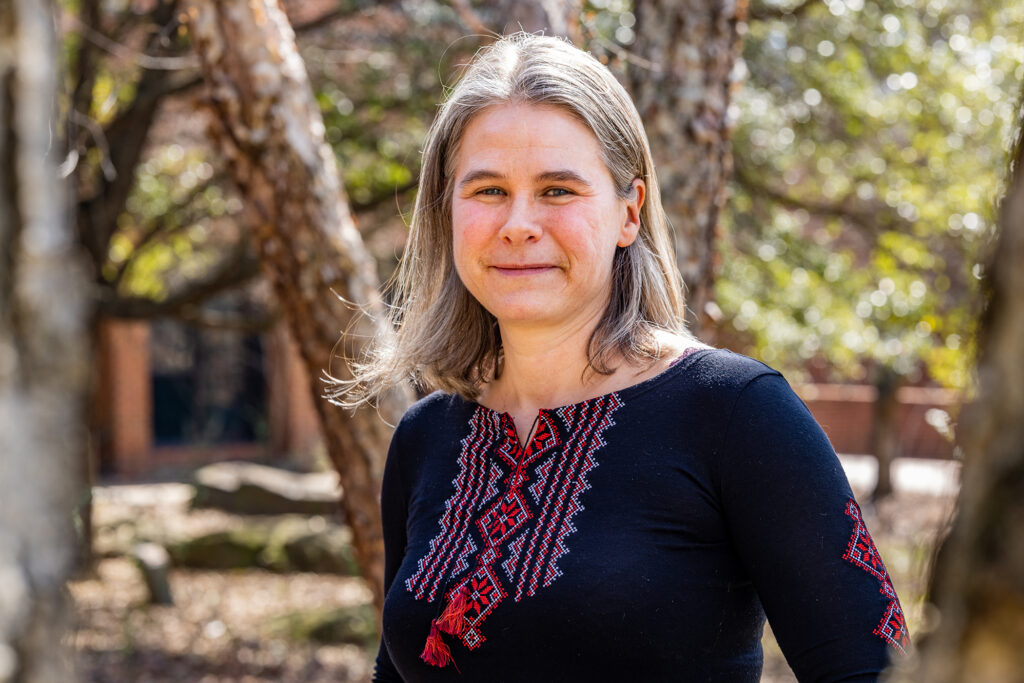Three University of Georgia faculty members have received the Russell Award for Excellence in Undergraduate Teaching, the university’s highest early career teaching honor for outstanding and innovative instruction.
The 2023 Russell Award recipients are:
- Jill Anderson, associate professor in the department of genetics, Franklin College of Arts and Sciences, and the Odum School of Ecology
- Richard Hall, associate professor in the Odum School of Ecology and the department of infectious diseases, College of Veterinary Medicine
- Laura Zimmermann, associate professor in the department of economics, Terry College of Business, and the department of international affairs, School of Public and International Affairs
“Through their active-learning course designs and personalized mentorship, this year’s Russell Award recipients inspire their students to learn and discover in the classroom and be prepared to lead and serve in their future careers,” said S. Jack Hu, the university’s senior vice president for academic affairs and provost. “They embody our university’s commitment to pursuing excellence in undergraduate education.”
Jill Anderson
From creating experiments and graphing predictions to interpreting results and designing follow-up studies, Anderson’s students put their learning into practice as engaged evolutionary ecology and genetics researchers. Her goal is to cultivate critical thinking within a welcoming environment and to demonstrate that science is a dynamic process.
Anderson encourages growth in the classroom, the laboratory and the field. She trains between eight and 12 undergraduates in her lab each semester and provides them with individualized mentoring to support their career goals and learning objectives. She also works with undergraduate field assistants and Research Experience for Undergraduate students each summer, conducting field work at the Rocky Mountain Biological Laboratory in Colorado.
In each of her classes, Anderson strives to create an inclusive environment. Through her assigned readings, she amplifies the voices of scientists who are often underrepresented in the classroom. With the help of graduate students and postdoctoral mentees, Anderson created a searchable database of ecology and evolutionary biology research publications that other UGA faculty can reference when diversifying their own courses.
“Her impact extends well beyond the classroom, impacting the future of academic research and creating a love of learning that will last for a lifetime,” wrote one of Anderson’s students.
Richard Hall
For Hall’s students, the UGA campus and Athens are living laboratories. His students have removed invasive species and created a pollinator garden on campus and designed educational activities for the Vulture Festival at the Athens-Clarke County landfill. Additionally, they’ve participated in the Great Georgia Pollinator Census.
He has also led students in study away programs focused on field ornithology in Costa Rica and ecological problem-solving on the Georgia coast. Whether on-campus or abroad, Hall engages his network of local NGOs and state agencies to create immersive student projects in conservation and environmental science.
In his large lecture courses, Hall uses think-pair-share activities and collaborative experiments to encourage innovation. He focuses on helping his students increase their science literacy and apply mathematical theory to life sciences case studies. As a first-generation college student, Hall understands the value of mentorship and strives to provide his students with academic and professional skills that will serve them throughout their lives.
“He showed me that the goal of research is not only to push the boundaries of your specific field, but to bring up the next generation of explorers, researchers and students and challenge them to go farther than you dreamt you could,” wrote a former student.
Laura Zimmermann
With a joint appointment in economics and international affairs, Zimmermann is known for her interdisciplinary approach to teaching. In a classroom simulation, her students apply key economic concepts as they take on the role of NGO workers allocating resources following the 2010 earthquake in Haiti.
Students in her politics of development course use declassified information from European governments and media channels alongside political science concepts as they study the Ethiopian famine of the 1980s. In addition to active-learning exercises, Zimmermann regularly uses photos and stories of her own travels and research abroad to provide context for her students.
“It is difficult to put a value on a student making the connection between their undergraduate studies and the ‘real world,’ but I think everyone can agree that it’s significant,” said Alice Kinman, senior lecturer in the UGA department of economics. “Dr. Zimmermann focuses on ensuring that all her students make that connection.”
Outside of the classroom, Zimmermann is a prolific advisor of undergraduate research and a champion in supporting and advising students underrepresented in their fields. She also provides key details about the industry and marketable skills through her “Career Corner” on eLC. This approach supports her goal of bringing the world into her classroom and empowering students in their research and career preparation.
Nominations for the Russell Awards are submitted by deans and considered by a committee of senior faculty members and undergraduate students. The awards are supported by the Richard B. Russell Foundation in Atlanta, and recipients receive $10,000. To learn more and see past recipients, visit the Russell Awards webpage.

